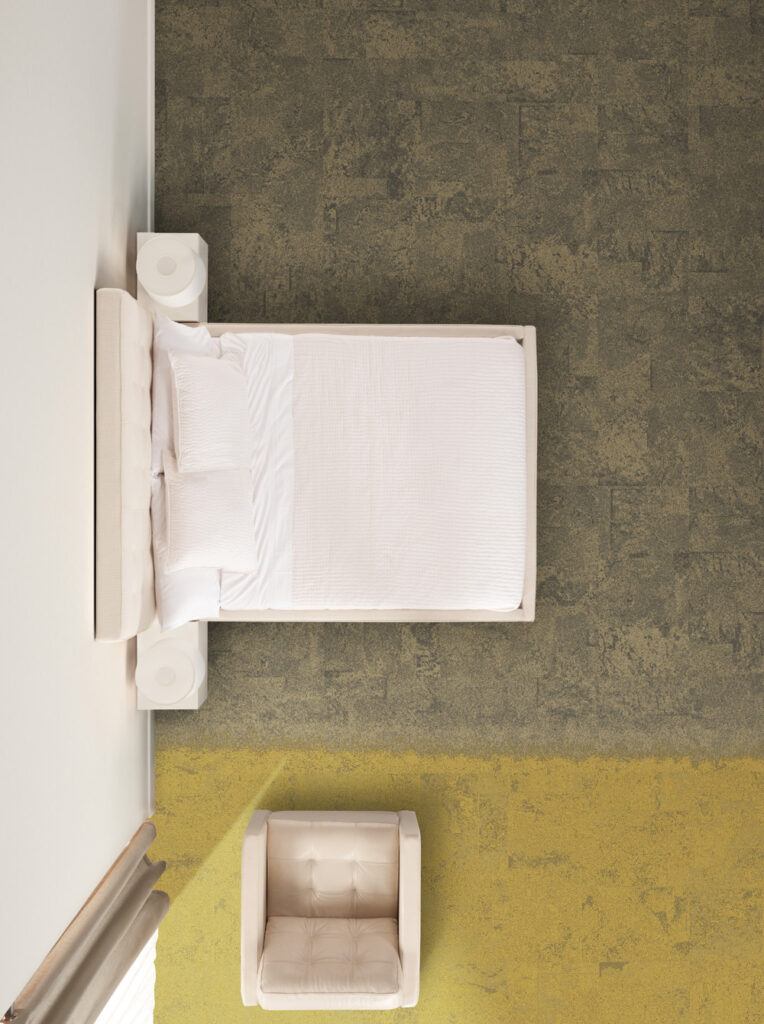Modular carpet is becoming a key trend in flooring for the hospitality sector, thanks to its high levels of flexibility and durability. Hannah Harper, European concept designer for hospitality at Interface, explains the main advantages of modular carpet and what it can bring to the design scheme as a whole.
It takes someone a matter of seconds to form an opinion on their surroundings, and the power of those first impressions should not be underestimated. This is particularly the case in the hospitality industry, where a polished image is vital to repeat custom and perceptions.
When it comes to creating a distinctive environment that will impress even the most discerning guest, modular carpet gives interior designers the freedom to create innovative flooring that really stands out. Flooring is a key component of interior design, and the use of complementary tones and rich textures is a great way to create a statement or evoke a particular ambiance.
The flooring industry is becoming increasingly imaginative in terms of design, variety of choice and creativity, and while flooring is ultimately a functional product – and it must be practical in order to ensure that the design maintains longevity – modular carpet is much more than that. The vast array of shades, styles, shapes, patterns and colour combinations that are available enable architects and designers to create a striking focal point, and provide a fantastic platform for an innovative interior design scheme.
A practical look at flooring
Maintaining interior furnishing to a high standard is essential. With so many guests passing through, surfaces exposed to wear and tear – including flooring – must be able to withstand the test of time. The concept of modular carpet provides flexibility when it comes to maintenance, as individual tiles can be replaced where necessary, rather than replacing the entire carpet if an area becomes damaged or worn.
For example, the areas around the bed may wear more quickly than other areas in the room, and these tiles can easily be swapped with those underneath the bed. Similarly, in busy areas, such as corridors, carpet tiles from the middle of the walkway can be switched with those along the edges as they become worn.
This offers the ultimate in flexibility and versatility, as you can quickly and easily replace tiles if they are damaged. Also, you can refresh your flooring, and the look of a room, simply by replacing some – rather than all – tiles.
Think outside the box
Modular carpet by its very nature is a flexible product that provides a wealth of design possibilities. People tend to think of carpet tiles as square, but new innovations such as Interface’s Planks show just how much the traditional carpet tile has evolved. Planks are narrow rectangular tiles that can be used on their own or with square format tiles, giving even more creative freedom and a new world of interior design possibilities.
When it comes to delivering a dynamic flooring solution without compromising on design, modular flooring offers a wealth of opportunities for the hospitality industry to create unique interior design schemes that really deliver that wow factor.
About Interface
Interface is a leader in the design and production of carpet tiles. Its products combine aesthetics and innovation with functionality and environmental credentials to help clients bring their design vision to life. The company was one of the first to publicly commit to sustainability, when it made a pledge in the mid-1990s – known as Mission Zero – to eliminate its impact on the environment by 2020.



